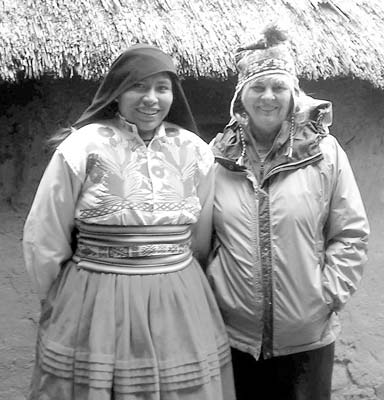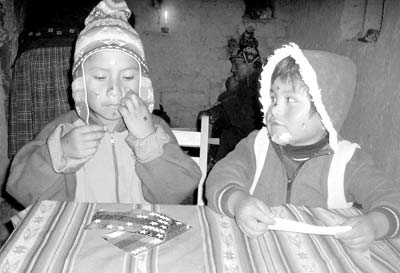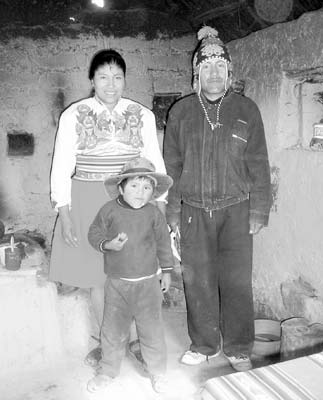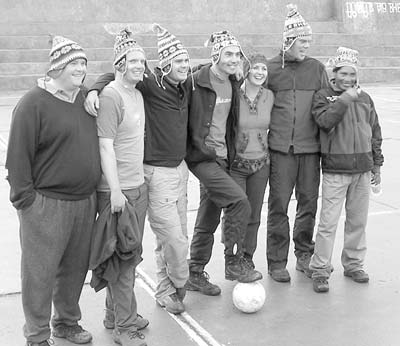A night on Lake Titicaca
by Andrea Granahan, Bodega, CA
Several times while in Peru, I felt as though I had reached the end of the world. Upon reaching the island of Amantani on Lake Titicaca, I felt that way again. Not only had we traveled far into the Andes to get to the lake, we had been riding for hours in a boat across the vast body of water.
Our day on the lake coincided with the first rainy day we had had in three weeks. Even though it was Peru’s spring, the rain was cold and the winds, sharp.
We all remember Lake Titicaca from school because of its funny name (which is the Aymara word for “puma rock”). We also learned it is the largest lake so very high up (about 14,000 feet). Now I knew what that kind of altitude felt like.
Family stay
We finally reached our island destination, where our tour leader had made arrangements for our group to stay with local families.
A local guide handed out a page of hard-to-pronounce Quechua words, since the islanders did not speak Spanish. Each word sounded like a sneeze, and it seemed to take a lot of syllables to say very simple things. “Hi” was “Ayiyanchu.” “Thanks” was “Yuspagarasunki.” We practiced on each other.
The path from the dock up the hill was tricky, since the rain had turned it into slick mud, but eventually we got there, looking muddy and bedraggled. An Irish girl named Catherine and I were introduced to a short, barrel-chested man named Nicholas. Nicholas grinned at us and we “Ayiyanchu-ed” him, then he led us up the mountainside on a sometimes stony, sometimes muddy path.
At one point he stopped, took off the blanket he was wearing and piled both our packs into it; bundling it over his shoulder, he bounded up the hill ahead of us.
The altitude had us breathless and needing to stop often, but Nicholas waited for us and encouraged us on. I discovered he knew some Spanish after all, which made communication much easier.
Getting adjusted
At his house he led us into a tiny courtyard. We climbed a stairway so steep it was more a ladder, and he led us into a spotless, charming room. We gratefully collapsed.
A few moments later he knocked on our door and introduced us to his wife, Justina. Their little boy had been sleeping, which is why she hadn’t met us at the boat, too, he explained. They brought us a thermos of hot water plus coca leaves, herbs and some sugar so we could make tea that would help us deal with the altitude.
All over in the mountains people had coca tea for us. The hotels had great urns of it always available and all cafés carried it. It really did help ease the difficulty in breathing and drove the high-altitude flash headaches away.
It takes over 50 pounds of the leaves to produce one gram of refined cocaine (which is illegal in Peru) and our tea usually had about three to five leaves in a cup, so don’t leap to any conclusions. Coca leaves are sacred there and part of all religious ceremonies.
The warm tea made us feel a lot better and we tried to rest, but in a very short time Justina came to get us. She gave us hats that she had knitted and had us follow her higher up the mountain. It seemed the locals wanted to challenge our tour group to a soccer game.
Local interaction
“I’ll be a cheerleader,” I told Catherine. Eventually, enough of the group showed up (there were 12 of us) and a team was formed. I thought for sure we’d be toast, but the young Brits and Aussies of our group had played futbol all of their lives and played a darn good game. The islanders won but not easily.
Then our local guide, Daniel, told us something about the island. In addition to having no electricity, Amantani has no health facilities; the islanders prefer their own traditional healers and only go to the mainland for help when the healer tells them they have to. He uses guinea pigs to diagnose illnesses and determine cures, we were told.
There are no vehicles on the island either. In the rocky, steep and roadless terrain they’d be useless. There is a school, though, where the children learn Spanish as a second language.
One person on the island had a solar panel that powered a small television, and sometimes a young male of courting age might invest in a battery-operated radio, but when the batteries run out they are seldom replaced because they are expensive. Otherwise, the islanders’ only connection to the outer world is by boat.
Our lesson over, we went back down the mountain — thoroughly frozen by this time as the rain had begun again.
Warming up
Back at the house I discovered Justina in her tiny adobe kitchen. She was starting a fire in her small, ingeniously designed fireplace. It had three holes in the top into which she set three earthernware pots. Just a few twigs were enough to get everything cooked.
I asked in Spanish if Catherine and I could join her. She seemed to understand.
“Catherine,” I called. “Fire. Warmth. Come on down.”
I presented Justina with the staples we had bought on the mainland: sugar, rice, oil and a can of Nescafé, a ubiquitous item in Peru.
Then Nicholas came in with their 5-year-old boy, Jimmy. A little neighbor boy a year or two older, Solferi, joined us. I had sheets of gold star stickers and fetched them out for the boys, pasting one on each child’s forehead.
That did it. The boys began plastering each other with stars. Before long they were so covered they looked like young Inka gods.
Solferi went home and Justina and Nicholas served us bowls of wonderful soup made of quinoa, a local grain, and vegetables. We were grateful for its warmth. Then we were given great plates of rice and vegetable stew. The islanders only eat meat a few times a year.
A night out
After dinner, the couple came to our room bearing armloads of clothes. The women on the island wear lots of short skirts — “To look like flowers,” Nicholas explained. They proceeded to dress us over our slacks and sweaters. The blouses were so encrusted with embroidery, they felt like armor.
We only had to wear two skirts each; some of the locals wore as many as ten. A tight sash tied it all together, compressing our beleaguered lungs.
Finally they deemed us ready. Justina looked lovely. We looked ridiculous. We marched back up the mountain in the rain, worrying about getting the beautiful clothes muddy.
At the town hall there were two bands playing. If soccer at these heights was hard, dancing was even harder. The dances lasted about 20 minutes and got faster and faster toward the end. And with two bands, there was no break between dances.
The whole town had turned out and for a couple hours they exhausted us. Jimmy and Justina and I danced nonstop.
There was some beer from the island’s only shop, but Catherine and I had used the drafty outhouse and didn’t want to have to get up during the night in the rain to use it again, so we abstained.
Jimmy had to get some sleep, so I made excuses to leave. We stumbled down the mountain and, with a little help from Justina, got out of our fancy duds. Then Catherine and I put on all of the clothes we had with us, took the blankets off an extra bed in an effort to get warm and fell asleep.
A fond farewell
The morning dawned with sun and warmth. A basin of hot water was brought to us to wash in, and we were given some more tea. Down in the kitchen, the family had made pancakes for breakfast.
Nicholas talked to me about America. I told him his life in Amantani was simpler and less stressful. He offered to build me a house next door so I could move in, since he was my “new son.”
After breakfast my new daughter, Justina, and Jimmy walked Catherine and me down to the docks. It had only been one night, but somehow it seemed I had known this family a long time. We all found it hard to say good-bye.
We waved as long as we could see one another as the boat pulled away from lovely Amantani.





